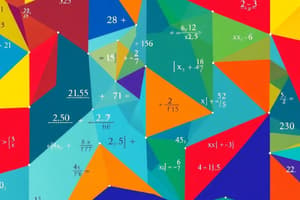Podcast
Questions and Answers
What is the primary focus of statistics?
What is the primary focus of statistics?
- Analyzing polynomials
- Drawing conclusions from data (correct)
- Plotting coordinates on a plane
- Exploring lines and angles
Which mathematical topic serves as a foundation for factoring, roots, and functions?
Which mathematical topic serves as a foundation for factoring, roots, and functions?
- Polynomials (correct)
- Lines and angles
- Coordinate geometry
- Statistics
In coordinate geometry, how are points typically represented on a two-dimensional plane?
In coordinate geometry, how are points typically represented on a two-dimensional plane?
- As circles
- As roots of polynomials
- As lines and angles
- As ordered pairs (correct)
Which type of equations involve two variables and are fundamental in mathematics?
Which type of equations involve two variables and are fundamental in mathematics?
Which topic in mathematics is primarily concerned with the relationship between points on a plane and their coordinates?
Which topic in mathematics is primarily concerned with the relationship between points on a plane and their coordinates?
What is the standard form of a linear equation in two variables?
What is the standard form of a linear equation in two variables?
Which type of angle measures exactly 90 degrees?
Which type of angle measures exactly 90 degrees?
What is the longest chord of a circle called?
What is the longest chord of a circle called?
If two lines extend infinitely and do not intersect, how are they classified?
If two lines extend infinitely and do not intersect, how are they classified?
What is the slope-intercept form of a linear equation in two variables?
What is the slope-intercept form of a linear equation in two variables?
Flashcards are hidden until you start studying
Study Notes
Mathematics: Exploring Essential Concepts
Mathematics is a fundamental, interconnected discipline, encompassing various topics that expand our understanding of the world around us. In this article, we'll delve into five essential subtopics of mathematics: statistics, polynomials, coordinate geometry, linear equations in two variables, lines and angles, and circles.
Statistics
Statistics is a field that focuses on gathering, analyzing, and drawing conclusions from data. It's a fundamental tool for making informed decisions and understanding trends in a wide range of fields, such as business, social sciences, and natural sciences.
Polynomials
Polynomials are algebraic expressions in which variables are raised to whole numbers or zero. These expressions often take the form of ax^n + bx^(n-1) + ... + c, where a, b, ..., c are numbers and n is a non-negative integer. Polynomials serve as a foundation for more advanced topics like factoring, roots, and functions.
Coordinate Geometry
Coordinate geometry is the branch of mathematics that deals with the relationship between points and their coordinates on a plane or in space. The Cartesian coordinate system, a two-dimensional plane, is the most common representation. In this system, points are represented as ordered pairs (x, y), where x and y represent distances along two perpendicular axes.
Linear Equations in Two Variables
Linear equations are first-order equations in which variables (sometimes called unknowns) are raised to the first power, and specific coefficients are attached to each variable and constant. Linear equations in two variables, often represented as y = mx + b, help us understand relationships between quantities and the slope-intercept form of linear equations.
Lines and Angles
Lines and angles are fundamental concepts in geometry. Lines are straight paths that extend infinitely in both directions. Angles are formed when two lines intersect, and their measure is expressed in degrees. Angles are classified as acute, right, obtuse, straight, or reflex.
Circles
Circles are two-dimensional shapes bounded by a continuous path called the circle's perimeter. A circle's center is a unique point equidistant from all points on its perimeter. The diameter is the longest chord of a circle, while the radius is the distance from the center to any point on the circle's perimeter. Properties such as area and circumference are derived from these fundamental concepts.
These six topics are just a small sampling of the vast and interconnected world of mathematics. Developing a strong grasp of these concepts will open doors to more advanced topics and help you understand the world around you in more profound ways. By deepening your understanding of these fundamentals, you'll be well on your way to becoming a confident and skilled mathematics learner.
Studying That Suits You
Use AI to generate personalized quizzes and flashcards to suit your learning preferences.




